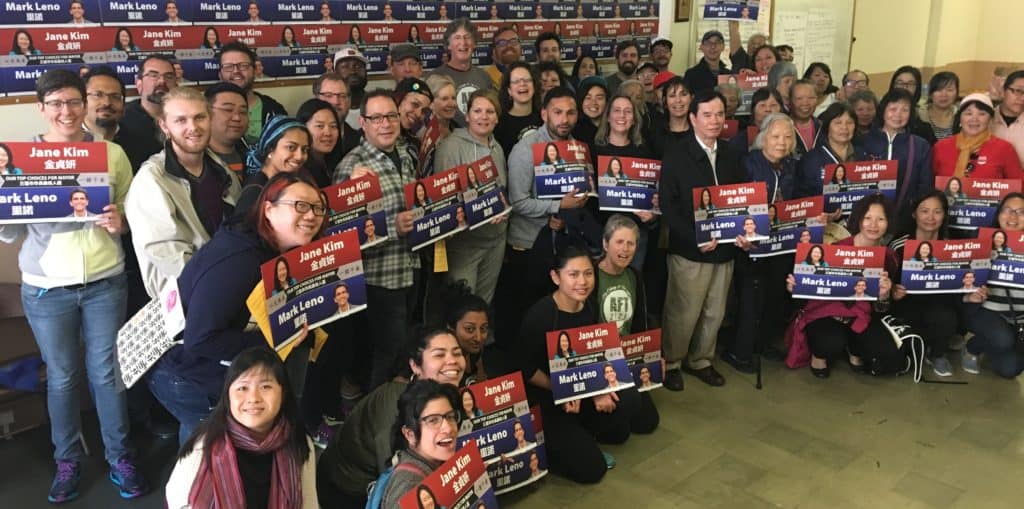To outsiders, San Francisco may look like a glittering city on a hill: an ethnically diverse metropolis, where tech dollars fuel a vibrant cultural scene and support progressive policies the rest of the nation can only dream about.

Women, LGBTQ and ethnic communities have long played leading roles in city politics, and San Francisco was among the first to enact same-sex marriage, a $15 minimum wage and a “right to counsel” law for tenants.
Yet at the San Francisco Rising Action Fund, we know our city’s progressive glitter is not gold. The dazzling wealth spawned by tech’s success has made the city virtually unliveable, especially for the working poor, as documented by U.N. special rapporteur Leilani Farha, who visited several Bay Area homeless encampments in January.
San Francisco has at least 7,500 homeless. In a city with a median home value of $1.3 million, the waitlist for homeless shelter beds is over 1,000 names long.
“The situation is unacceptable in light of the wealth of the country,” Farha told the Guardian. And the city, she says, has a legal and moral obligation to provide shelter.
“That’s something your government is supposed to do,” Farha told the homeless residents she met living in encampments. “I hate to tell you, you’re being ripped off.”
The Question is Why
San Francisco’s rising inequality has been well-documented, as have its skyrocketing rents. What isn’t as clear is why, despite our wealth, our city hasn’t been able to do much about it.
One answer is that the Democrats who control city government have long favored the interests of giant tech corporations, real-estate developers, and landlords over the city’s residents. And as long as our elected leaders craft policies that most benefit those who fuel our housing crisis, we will never be able to address the structural reasons that cause homelessness and poverty.
Double-Dipping
This is why San Francisco Rising Action Fund convened a community-labor coalition to endorse not just one - but two - progressive candidates to elect a new mayor for the city. The special election, held June 5 to fill the seat left empty after the unexpected death of Mayor Ed Lee, has been the most expensive mayor’s race ever in the city’s history.
The campaign of the frontrunner, London Breed, has been largely funded by deep-pocketed venture capitalists, technology industry CEOs, and realtor associations. Jane Kim and Mark Leno, who both support sweeping housing reforms and sensible curbs on tech’s sway over city government, knew the only way one of them could win would be to work together in a rank-choice strategy, encouraging the other’s supporters to vote them as their #2 choice.
San Francisco’s ranked-choice voting system, which enables voters whose first-choice candidate doesn’t win to register a vote for their second or third choice, has been been in place since 2004. But for two candidates to endorse each other in this way was unheard of.
San Francisco Rising Action Fund knew, too, that this was our city’s best bet for progressive solutions to our city’s housing crisis, so we joined an unprecedented coalition of progressive labor, community, tenant, and democratic clubs to pull off what may be the most hotly contested race for Mayor San Francisco has ever seen.
The San Francisco Rising Action Fund works to build the political power of working-class communities of color in San Francisco. In and out of election years, we build powerful community-labor coalitions to run campaigns and independent expenditures to elect progressive, grassroots leaders for state and local offices.
Neck And Neck
Thanks to this strategy, 25,231 Kim voters were able to transfer their votes to Leno on election night, putting him ahead of Breed, with 50.42 percent of all votes. But a large number of absentee votes still left to count makes the race too close to call.
Leno and Breed are now neck-and-neck, with Leno holding a razor-thin lead of 144 votes on Friday, and Breed pulling ahead on Monday. But with 25,000 votes still to count, we won’t know who San Francisco’s next mayor will be for several more days.
No matter the outcome, San Francisco voters have spoken, and say loud and clear that ours is a city desperately sick of the poverty that has become so common in its streets. We are looking for change of the status quo, and leadership that emboldens us to find true solutions, not band-aids.
So whomever you turn out to be, Mayor-Elect, we welcome you - come join the clear majority of San Franciscans who want real solutions, and real homes, for working families, tenants, and all of our great city’s most vulnerable residents.

